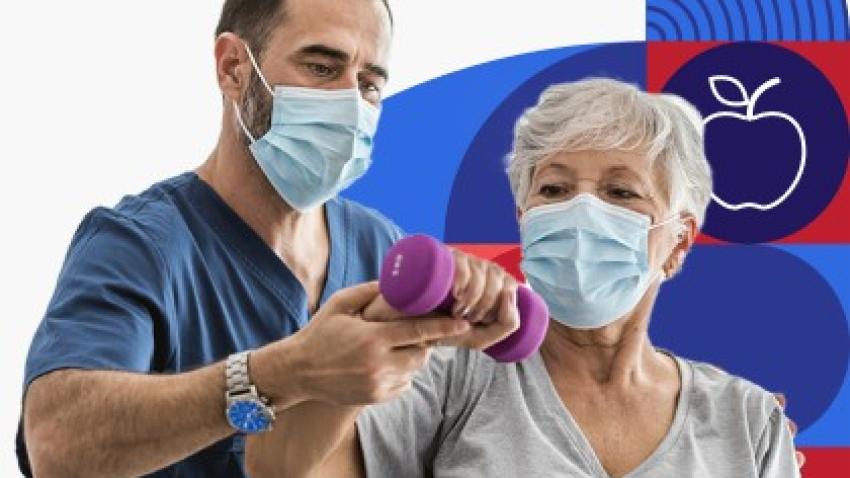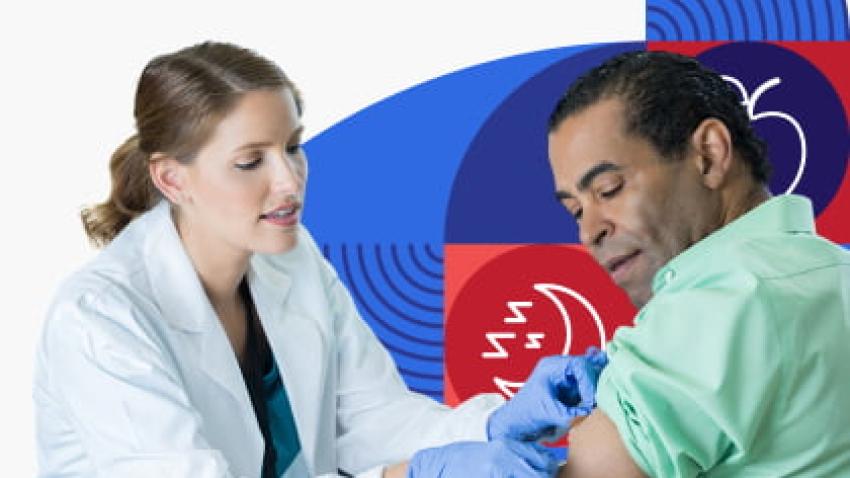Doctor Visits
Get Vaccines to Protect Your Health (Adults Age 50 Years or Older)

The Basics
Overview
Older adults need to get vaccines (shots) to prevent serious diseases. Protect your health by getting all your vaccines on schedule.
If you're age 50 years or older:
- Get a shingles vaccine. Shingles causes a painful rash that can last for months. Learn about shingles vaccines.
If you’re age 60 years or older:
- Talk to your doctor about getting an RSV vaccine. RSV (respiratory syncytial virus) infections are usually mild, but can be serious for some people. Learn more about RSV vaccines.
If you're age 65 years or older:
- Get a pneumococcal vaccine. Pneumococcal disease can include pneumonia, meningitis, and blood infections. Learn about pneumococcal vaccines.
It’s also important for all adults to:
- Get a flu vaccine every year. The seasonal flu vaccine is the best way to protect yourself and others from the flu. Learn about the flu vaccine.
- Get the Tdap vaccine to protect against tetanus, diphtheria, and whooping cough (pertussis). Everyone needs to get the Tdap vaccine at least once. Learn about the Tdap vaccine.
- After you get a Tdap vaccine, get a Td vaccine every 10 years to keep you protected from tetanus and diphtheria. Learn about the Td vaccine.
- Get a COVID-19 vaccine to protect yourself and others from COVID-19. Find a COVID-19 vaccine near you.
Ask your doctor, nurse, or pharmacist about other vaccines you may need to stay healthy.
Health Benefits
Why do I need to get vaccines?
Vaccines help protect you from diseases that can be serious — and sometimes deadly. Many of these diseases are common, but vaccines can prevent them.
Even if you’ve always gotten your vaccines on schedule, you still need to get some vaccines as an older adult. That’s because:
- Older adults are more likely to get certain diseases
- Older adults are at higher risk for serious health problems caused by diseases like COVID-19 or the flu
- Protection from some vaccines can wear off over time
Getting vaccinated also protects other people.
When you get vaccines, you don’t just protect yourself — you also protect others. This is especially important if you spend time around anyone with a long-term health problem or a weakened immune system (the system in the body that fights infections).
Protect yourself and the people around you by staying up to date on your vaccines. Find out how getting vaccinated helps protect people in your community.
Other Vaccines
Do I need any other vaccines to help me stay healthy?
You may need other vaccines if you:
- Have a long-term health condition like diabetes or heart, lung, or liver disease
- Didn’t get all your vaccines when you were a child
- Have a health condition that makes it harder for your body to fight off infections — like HIV or problems with your spleen
- Are a man who has sex with men
- Smoke
- Spend time with infants or young children
- Travel outside the United States
And you may need other vaccines if you work in certain places, like a hospital or nursing home.
Ask your doctor, nurse, or pharmacist if you need any other vaccines. Find out what vaccines are recommended for you.
Take Action
Make a Plan
Talk with a doctor, nurse, or pharmacist about getting up to date on your vaccines.
Make a plan to get your vaccines.
Schedule an appointment with your doctor or nurse to get the vaccines you need. You may also be able to get vaccines at your local pharmacy.
If you’re not sure where to start, call your doctor’s office or local health department.
Get a seasonal flu vaccine every year.
Remember, everyone age 6 months and older needs to get the seasonal flu vaccine every year. You can use this tool to find flu vaccines near you.
What about cost?
Under the Affordable Care Act, most insurance plans must cover recommended vaccines. Depending on your insurance plan, you may be able to get your vaccines at no cost to you. Check with your insurance company to find out more.
Medicare also covers most recommended vaccines for older adults at no cost. If you have Medicare, use this tool to see what Medicare covers.
If you don’t have insurance, you still may be able to get free or low-cost vaccines:
- Find a health center near you and ask about vaccines
- Find a free or low-cost vaccine program in your state
To learn more, check out these resources:
Keep a Record
Keep a copy of your vaccination record.
Ask your doctor to print out a record of all the vaccines you've had. Keep this record in a safe place. You may need it for certain jobs or if you travel outside the United States.
If you're not sure which vaccines you’ve had, try these tips for finding old vaccination records. If you still can’t find a record of your vaccines, talk with your doctor about getting some vaccines again.
If you got vaccinated for COVID-19, you might have a paper card that lists when and where you got your vaccine doses. Keep the card in a safe place with the rest of your vaccine records. If you lost the card or don’t have one, you can contact the pharmacy or doctor’s office where you got vaccinated for COVID — or your state’s health department — to get a copy of your vaccination records.
Content last updated April 4, 2024
Reviewer Information
This information on vaccines for older adults was adapted from materials from the Centers for Disease Control and Prevention.
Reviewed by:
Justin Mills, M.D., M.P.H., F.A.A.P
Medical Officer, U.S. Preventive Services Task Force Program
Center for Evidence and Practice Improvement
Agency for Healthcare Research and Quality


